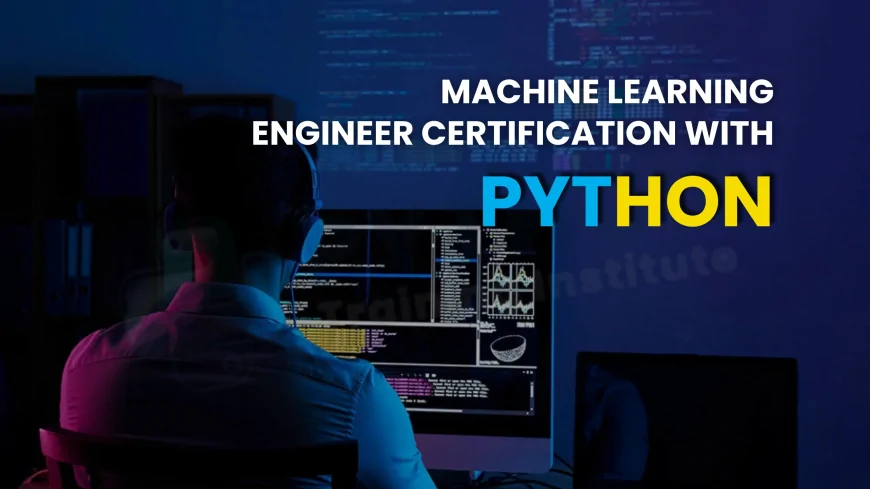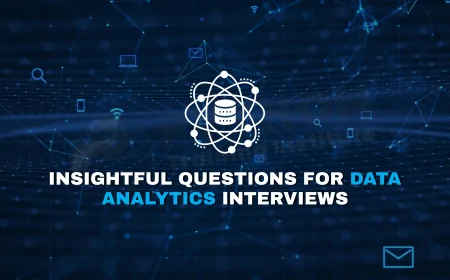Machine Learning Engineer Certification Using Python Pune | Certified Machine Learning Engineer Course with Python
Enroll in top-rated Machine Learning Engineer Certification using Python in Pune. Learn ML algorithms, Python, TensorFlow, real-time projects, and get job-ready with placement assistance.

Table of Contents
- Why Pursue ML Engineer Certification?
- Core Skills Covered
- Detailed Curriculum Overview
- ML Tools & Frameworks
- Hands-On Projects You’ll Build
- Delivery Format & Schedule
- Leading Certification Providers in Pune
- Career Growth & Job Roles
- Eligibility & Prerequisites
- Duration, Fees & Formats
- FAQs
- Conclusion
Why Pursue ML Engineer Certification?
- Expert Validation: Recognizes your proficiency in applying ML algorithms to real-world problems.
- Industry Trust: Recognized credentials increase recruiter confidence.
- End-to-End Learning: From data cleaning to model deployment.
- Fast-Growing Demand: AI roles expanding across Pune's tech firms and startups.
Core Skills Covered
- Data analysis & visualization (Pandas, Matplotlib)
- Supervised: regression, classification
- Unsupervised: clustering, dimensionality reduction
- Deep Learning basics (neural networks)
- Model evaluation, cross-validation, hyperparameter tuning
- Pipeline creation and production deployment
Detailed Curriculum Overview
- Data Wrangling: Clean, transform, feature engineer
- Statistical Foundations: Probabilities, distributions, hypothesis testing
- ML Algorithms: Linear/logistic regression, decision trees, SVM, KNN
- Unsupervised Learning: k-Means, PCA
- Deep Learning: TensorFlow/Keras model design
- Model Serialization: pickle, joblib
- Deployment: Flask APIs, Docker, cloud deployment
ML Tools & Frameworks
- Python 3.x, Jupyter Notebooks
- NumPy, Pandas, Matplotlib, Seaborn
- scikit-learn for traditional ML
- TensorFlow/PyTorch for deep learning
- Flask/FastAPI for model deployment
- Docker & basic CI/CD
Hands-On Projects You’ll Build
- House price prediction regression pipeline
- Bank loan default prediction classifier
- Customer segmentation using clustering
- Image classifier (cats vs dogs) using CNN
- Real-time API to serve model predictions
- Deploy ML model on Heroku/Docker container
Delivery Format & Schedule
- Live-online evenings/weekends + recorded sessions
- Weekend classroom labs in Pune
- Hybrid: online theory + weekly offline project labs
- Self-paced video + monthly live mentoring
Leading Certification Providers in Pune
- WebAsha Technologies specializes in training future-ready professionals in machine learning with hands-on experience in TensorFlow, deployment, and job placement.
Career Growth & Job Roles
- Machine Learning Engineer
- Data Scientist
- AI Developer
- Business Intelligence Engineer
- ML Ops Engineer
- Salary Range: ₹6–12 LPA (entry/mid), ₹15–30+ LPA (senior)
Eligibility & Prerequisites
- Strong Python basics and OOP knowledge
- Comfort with math (statistics/linear algebra)
- Understanding of data handling and visualization
- Fundamental ML awareness preferred
Duration, Fees & Formats
- 12–24 weeks depending on pacing
- Ranges from ₹35,000–₹1,00,000
- Includes project, certification, and placement support
- Group discounts, EMI, scholarships available
Embark on your AI journey today—transform data into intelligent systems!
Frequently Asked Questions (FAQs)
1. Do I need math for ML?
Yes—basic statistics and linear algebra help, especially for understanding algorithms.
2. Can beginners join?
Beginner-friendly up to data basics; advanced tracks assume some prior experience.
3. Is Python mandatory?
Yes—this certification is Python-based and uses its ML ecosystem.
4. Will I work on real data?
Absolutely—project datasets include real-world housing, finance, and imaging data.
5. Do you cover deep learning?
Yes—a CNN image classification module with TensorFlow or PyTorch is included.
6. Is deployment covered?
Yes—you’ll build a REST API and deploy your model using Flask and Docker/Heroku.
7. Are placements guaranteed?
No guarantees—but strong placement support is provided via resume prep, mock interviews, and referrals.
8. Can I study while working?
Yes—all formats accommodate working professionals with flexible scheduling.
9. Do I get certification?
Yes—a verified certificate upon project completion, recognized by Pune tech firms.
10. How much effort is required?
Expect 8–12 hours per week for live + self‑study, depending on pacing.
11. Are group discounts available?
Yes—many institutes provide discounts for teams or early enrollment.
12. Is AI ethical training included?
Some courses include modules on bias, privacy, and ethics in ML systems.
13. Can projects be customized?
Yes—mentors often guide on capstone customization to fit learners’ domains.
14. What tools are used?
Jupyter, Git, Python libraries, TensorFlow or PyTorch, Flask/FastAPI, Docker CLI.
15. Is cloud access needed?
Basic cloud access (free-tier AWS/GCP) may be used for deployment labs.
16. Do I learn MLOps?
Basic pipeline and CI/CD modules are included; advanced MLOps tracks may be separate.
17. Will I learn notebook practices?
Yes—clean code, markdown usage, reproducible experiments are emphasized.
18. Do you teach unsupervised learning?
Yes—expected modules include clustering and dimensionality reduction (PCA).
19. Are there live doubt‑clearing sessions?
Absolutely—live mentorship, office hours, and peer-assisted workshops are common.
20. How do I enroll?
Contact the provider’s Pune office or fill out the online inquiry form to reserve your seat.
Conclusion
Becoming a certified **Machine Learning Engineer with Python** is a strategic step toward a high-impact, well-compensated tech career. Pune’s top providers offer structured training, real projects, and mentorship, enabling learners to build end-to-end ML solutions and transition into AI-focused roles with confidence.
What's Your Reaction?
 Like
0
Like
0
 Dislike
0
Dislike
0
 Love
0
Love
0
 Funny
0
Funny
0
 Angry
0
Angry
0
 Sad
0
Sad
0
 Wow
0
Wow
0














